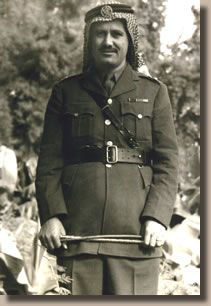While Eltaher was in Damascus in 1955, the Syrian leadership succeeded in engineering a reconciliation between him and the Hashemite regime in Jordan. Eltaher was a life-long fierce enemy of King Abdullah I, the grandfather of the late King Hussein, and great-grandfather of the current King Abdullah II.
The Hashemite Kingdom of Jordan, initially called The Emirate of Transjordan was a creation of the British, and Emir, then King Abdullah Bin Al-Hussein I was parachuted there in 1921 from the Hejaz in Arabia. The king was supported, first by a British garrison, then by recruits among the Arab beduin tribes commanded by British officers and NCOs. They constituted what was known as the Arab Legion, “
Al-Jaysh Al-Arabi”, under the command of Lieutenant-General Sir John Bagot Glubb, or Glubb Pasha, as he was known
22.
Eltaher was opposed to this new entity for a number of reasons: First, because it was yet another British creation in the region. More importantly, because while the Palestinians were defending themselves against both British occupation of their country, and the influx of foreign Jewish immigrants and Jewish fighters in the 1930s and 1940s, King Abdullah I, was conniving with the leadership of the Zionist Movement and the Jewish Agency in order for him to get certain parts of Palestine23.
This was taking place while soldiers and officers of the Arab Legion, i.e. his own army, were falling under Jewish fire. Concurrently, he was preventing volunteers, military supplies and ammunition from reaching the Palestinian fighters. To the Palestinians this was tantamount to high treason during war time. No wonder they assassinated King Abdullah I in 1951 after the loss of most of Palestine.
Had it not been for the successful military operations led by the commander of the Arab Legion in Jerusalem, Colonel Abdallah Al-Tal and his officers in the West Bank in 1948 and 1949, the old city of Jerusalem and all of its surroundings would have fallen to the Israelis too at that time. Colonel Al-Tal’s initiative had prevented the old city and some of its neighbourhoods from falling into the hands of the Jewish Haganah forces24. Though the city and what had remained of Palestine did eventually fall to them following the 1967 war, commonly known as the “Six-days War”.
|
| Colonel Abdallah Al-Tal, Governor of Jerusalem in 1948 |
The Syrian leaders probably managed to convince their friend Eltaher that, since King Hussein, who had ascended the Hashemite throne following the abdication of his father King Talal, and later on dismissed Glubb Pasha, has been reaching out to the Palestinians in a number of ways, it would serve nothing for Eltaher to keep the fire on him and his kingdom, and that the time was ripe to let bygones be bygones. Eltaher must have agreed, because, when the King came to Damascus on an
official visit, Syrian President Shukri Al-Quwwatli brought the two men together and staged the reconciliation.

